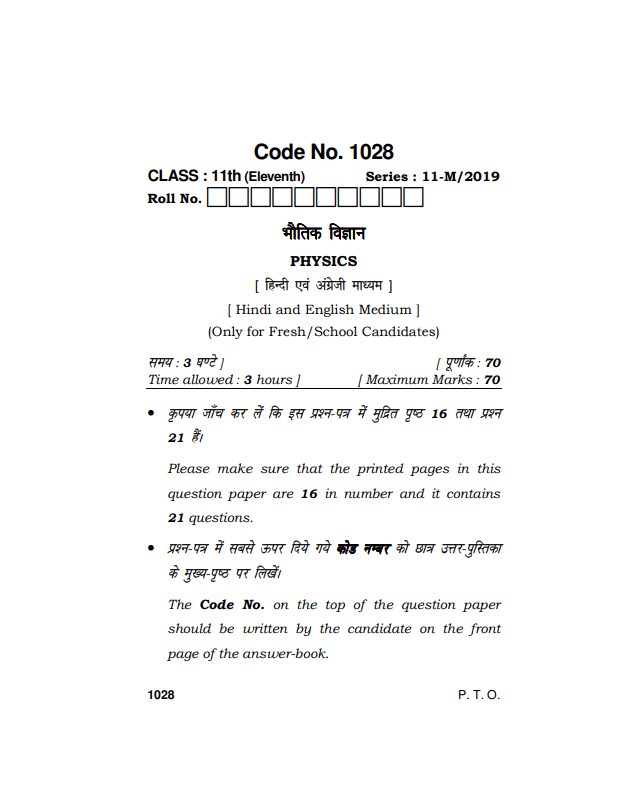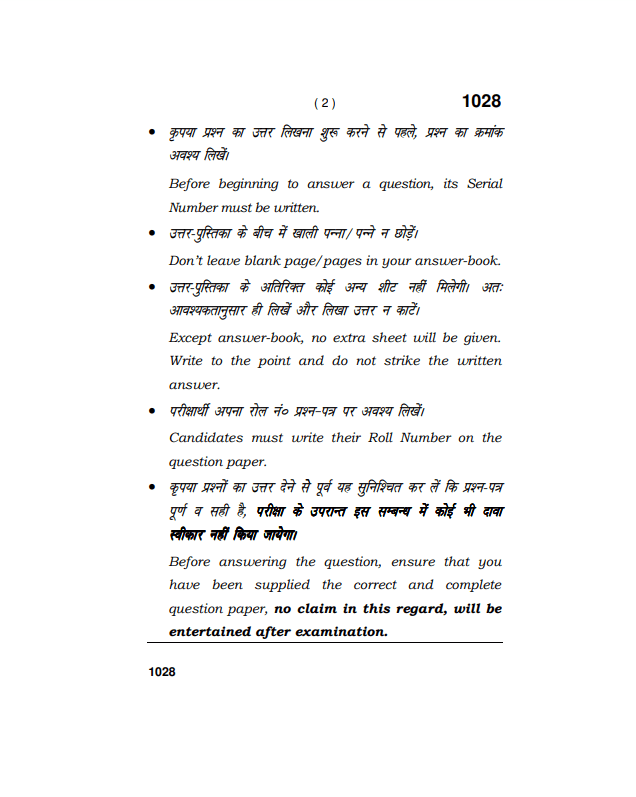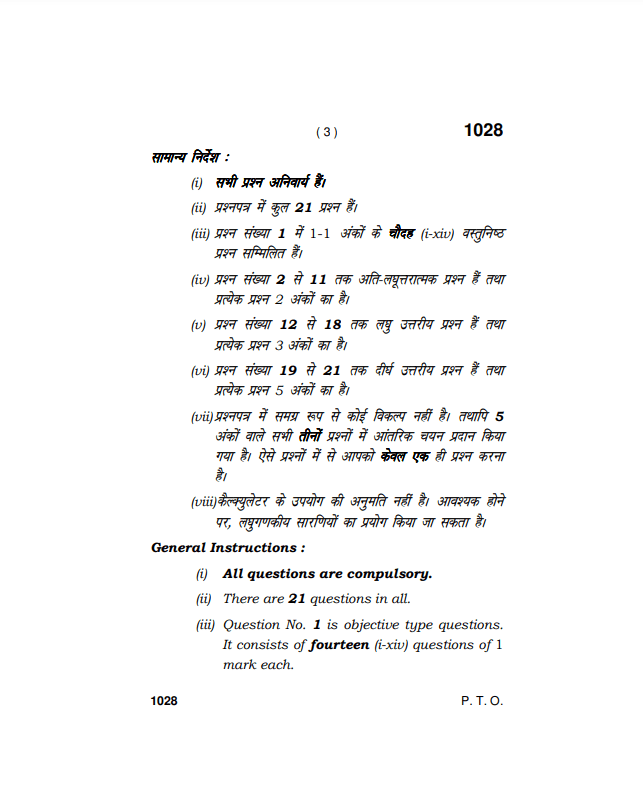11th Class Physics Question Paper 2019 HBSE : With the help of our website, which has an extensive collection of HBSE 11th Class Previous Year Question Paper, you may successfully prepare for your HBSE Class 11th Exam. Get access to a large selection of past exam questions that have been carefully chosen to cover subjects related to the Class HBSE Class 11th course . Download practice tests in several formats, such as multiple-choice questions (MCQs) and descriptive questions, to help you prepare for exams and increase your confidence. With the help of our platform, you can revise with concentrate and recognize important themes and question formulation trends. Get ongoing help and direction to help you prepare for and pass the HBSE Exam.
- Introduction : 11th Class Physics Question Paper 2019 HBSE
- Download : 11th Class Physics Question Paper 2019 HBSE with Solution
- Syllabus : 11th Class Physics Question Paper 2019 HBSE
- Exam Pattern : 11th Class Physics Question Paper 2019 HBSE
- Significance of 11th Class Physics Question Paper 2019 HBSE
- Tips for Good Preparation : 11th Class Physics Question Paper 2019 HBSE
- FAQs : 11th Class Physics Question Paper 2019 HBSE
Introduction : 11th Class Physics Question Paper 2019 HBSE
Introduction to the HBSE Class 11 Physics Exam
The purpose of the HBSE Class 11 Physics test is to evaluate students’ comprehension of basic physics ideas and how they apply them in diverse contexts. The syllabus for this exam is usually quite extensive, covering topics like thermodynamics, mechanics, and waves, which are examples of fundamental physics concepts. Exams typically include multiple-choice, short answer, and long answer questions in order to assess candidates’ theoretical knowledge as well as their ability to solve problems. In addition, internal examinations and practical work add to the overall evaluation, offering a thorough appraisal of a student’s subject-matter proficiency.
Exam Structure
The HBSE Class 11 Physics exam comprises a 3-hour theory paper worth 70 marks and a practical exam worth 30 marks. The theory paper includes:
- Section A: 20 multiple-choice questions, 1 mark each.
- Section B: 8 short answer questions, 2 marks each.
- Section C: 6 long answer questions, 5 marks each.
Practical exams and internal assessments contribute an additional 30 marks. This structure evaluates both theoretical understanding and practical skills.
Preparation Tips
- Understand the Syllabus: Review the syllabus thoroughly to know which texts and topics will be covered.
- Practice Past Papers: Solving previous years’ question papers can help you get a feel for the types of questions asked and the exam format.
- Review Key Concepts: Revisit important themes, character details, and stylistic elements of the prescribed texts.
- Work on Writing Skills: Practice writing essays and letters to improve clarity, organization, and grammar.
Conclusion
In conclusion, a balanced evaluation of theoretical knowledge and practical abilities is used in the HBSE Class 11 Physics test to thoroughly examine students’ understanding of basic physics principles. The exam’s organized approach, which combines a practical component with multiple-choice, short answer, and long answer questions, attempts to guarantee that candidates have a thorough grasp of the material. A firm understanding of the material, strong problem-solving abilities, and practical laboratory experience are necessary for exam success.
Download : 11th Class Physics Question Paper 2019 HBSE with Solution
| Previous Year Question Paper of Physics Class 11 HBSE | Question Papers |
|---|---|
| 11th Class Physics Question Paper 2019 HBSE | Download Here |



Syllabus : 11th Class Physics Question Paper 2019 HBSE
| Unit | Topics |
|---|---|
| 1. Physical World and Measurement |
|
| 2. Kinematics |
|
| 3. Laws of Motion |
|
| 4. Work, Energy, and Power |
|
| 5. Motion of System of Particles and Rigid Body |
|
| 6. Gravitation |
|
| 7. Properties of Bulk Matter |
|
| 8. Thermodynamics |
|
| 9. Behaviour of Perfect Gas and Kinetic Theory |
|
| 10. Oscillations and Waves |
|
Exam Pattern : 11th Class Physics Question Paper 2019 HBSE
| Section | Type of Questions | Number of Questions | Marks per Question | Total Marks |
|---|---|---|---|---|
| Section A | Multiple Choice Questions (MCQs) | 20 | 1 | 20 |
| Section B | Short Answer Questions (SAQs) | 8 | 2 | 16 |
| Section C | Long Answer Questions (LAQs) | 6 | 5 | 30 |
| Practical Exam | Practical Work and Lab Experiments | — | — | 30 |
| Total | — | — | — | 70 |
Significance of 11th Class Physics Question Paper 2019 HBSE
The significance of 11th Class Physics Question Paper 2019 HBSE lies in their ability to serve as valuable study resources for candidates preparing for the HBSE examination. Here are some key reasons why these question papers are important:
Exam Blueprint Revealed:
The actual exam is modeled by these papers. You can learn a lot about the arrangement of the questions, the relative importance of the various areas on the syllabus, and even the degree of difficulty by carefully examining them. This enables you to customize your study and give priority to the subjects that need greater attention.
Improving Your Skills:
Using past year papers for practice is similar to taking practice exams in a real exam setting. You get to put your speed, accuracy, and conceptual understanding to the test in a virtual setting. This assists in determining your areas of strength and weakness prior to the exam, enabling you to improve your strategy and reinforce your comprehension of important subjects.
Building Exam Stamina:
The BSSC exam may have a time limit, therefore success depends on your ability to manage your time well. You can improve your endurance and time management abilities for the test by using previous year’s papers. You can learn to pace yourself, prioritize questions, and stay away from becoming bogged down on any one problem by practicing in a timed environment.
Increasing Confidence:
Completing last year’s papers successfully boosts your self-assurance and eases exam anxiety. Observing that you can appropriately respond to questions validates your understanding and inspires you to keep trying. Your overall exam performance is significantly impacted by this positive reinforcement.
Finding Recurring Patterns:
Although the precise questions won’t be asked again, reviewing previous exams frequently identifies patterns in the subjects and question types that are asked again. This enables you to create focused strategies for answering the kinds of questions you might encounter on the actual exam by anticipating their types.
It’s like having a secret weapon when you use the 11th Class Physics Question Paper 2019 HBSE in your preparing approach. They sharpen your abilities, give you confidence boosts, and offer priceless insights, all of which considerably raise your chances of succeeding on test day.
Tips for Good Preparation : 11th Class Physics Question Paper 2019 HBSE
Recognize the test and syllabus:
Visit the HBSE website to download the official announcement and curriculum.
Recognize the format of the exam (number of sections, weighted scores, time allotment).
Learn everything there is to know about the subjects included on the curriculum for each area.
Create a Timetable and Study Plan:
Make a realistic study schedule with time allotted for each section based on the syllabus and your preferred method of learning.
Establish study times on a daily or weekly basis, and try your best to maintain them.
Be adaptable and make necessary changes to your plan, but consistency is essential.
Establish a Robust Base:
Pay close attention to the fundamental ideas in each area, paying particular attention.
Learn the fundamental, shortcuts, and approaches to solving problems.
Make Use of Educational Resources
Make use of top-notch study resources, such as online courses, textbooks, and coaching materials (if necessary).
Exam patterns and time management exercises can be learned by looking at previous year’s question papers and practice exams.
Consistent Practice:
Every day, complete practice questions from different sources.
Prioritize precision while progressively picking up speed.
Examine your errors and determine what needs to be improved.
By following these tips and dedicating yourself to consistent preparation, you can significantly increase your chances of success in the 11th Class Physics Question Paper 2019 HBSE. Remember, the key is to start early, work hard, and stay focused on your goal.
FAQs : 11th Class Physics Question Paper 2019 HBSE
Q1: What is the syllabus for the Physics Class 11 exam?
A1: The syllabus typically covers topics like Physical World and Measurement, Kinematics, Laws of Motion, Work, Energy and Power, Motion of System of Particles and Rigid Body, Gravitation, Properties of Bulk Matter, Thermodynamics, Behaviour of Perfect Gas and Kinetic Theory, Oscillations and Waves.
Q2: How is the Physics Class 11 exam structured?
A2: The exam generally includes a mix of objective questions (multiple choice), short answer questions, and long answer questions. The exact format may vary, so it’s important to check the latest syllabus and exam pattern from HBSE.
Q3: What is the duration of the Physics Class 11 exam?
A3: The duration is usually 3 hours, but it’s best to confirm this from the official HBSE exam schedule or the admit card.
Q4: How should I prepare for the Physics Class 11 exam?
A4: Start by thoroughly understanding the syllabus. Use textbooks prescribed by HBSE, solve previous years’ question papers, and take practice tests. Focus on understanding concepts rather than rote memorization.
Q5: Are there any recommended reference books for Physics Class 11?
A5: Popular reference books include “Concepts of Physics” by H.C. Verma, “Understanding Physics” by D.C. Pandey, and “Objective Physics” by S. Chand. However, make sure to prioritize the HBSE syllabus and textbooks first.
Q6: How can I improve my problem-solving skills in Physics?
A6: Practice is key. Work on a variety of problems, especially those that challenge your understanding. Don’t hesitate to seek help from teachers or study groups if you find certain concepts difficult.






